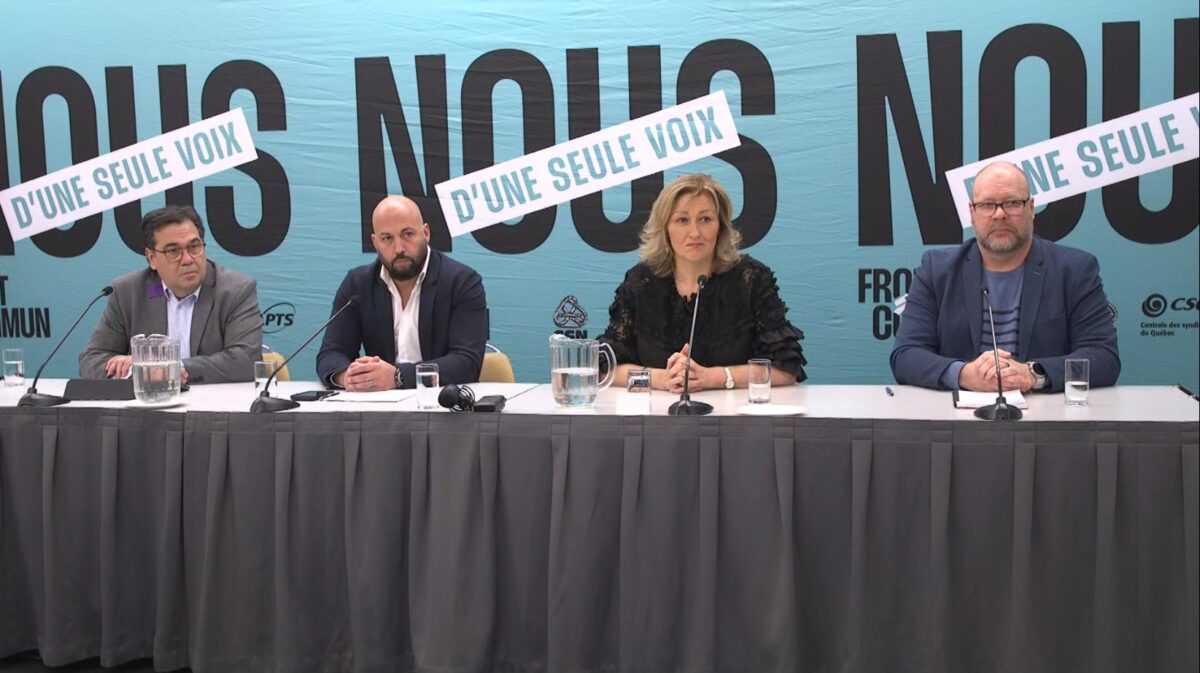With a new year comes a potentially new attitude from Quebec Premier François Legault’s government regarding negotiations with the unions representing more than half a million public sector workers in the province. On December 28, the Fédération autonome de l’enseignement (FAE) reached a tentative agreement with the provincial government for a new contract and ended the unlimited strike of more than 66,000 teachers that began November 23.
FAE members were not the only ones in negotiations for a new contract at the end of 2023. The Front commun, which represents four major unions in Quebec, was negotiating on behalf of 420,000 public sector workers for better working conditions and salaries, among other things. After 11 non-consecutive days of strike, union leaders and members were prepared for the possibility of a general unlimited strike in 2024.
The Front commun announced on January 3 that it and the Legault government reached a tentative deal “at the end of December” that members will have a chance to question and debate in general assemblies that will begin in January. The highlight of the government’s proposition is a historic 17.4 per cent pay raise over five years and a clause that protects public sector workers’ purchasing power.
In a follow-up statement published January 7, the Front commun shared how the 17.4 per cent would be distributed across the five-year period of the contract. Workers will also be able to access a fifth vacation week two-to-six years earlier than previously permitted. Employers’ contributions to employee health insurance will increase by $150 for individuals and $300 for families. The last detail the bargaining unit shared was that all public sector psychologists will receive a 10 per cent pay increase with the possibility of another 6.5 per cent for any psychologist that works the “full number of hours associated with their job title.”
The FAE will only share the terms of their potential deal once the provisions have been presented to the nine affiliate unions that make up the FAE.
According to Dr. Anna Sheftel, an oral historian who is also the principal and associate professor in Concordia’s School of Community and Public Affairs, while the Front commun’s and FAE’s achievements are historic, they still are not enough for public sector workers.
“I think we are in a position where wages have not risen with inflation historically and now with inflation being so high, it’s so hard to catch up,” Sheftel said in an interview with rabble.ca. “I think that they did amazingly well, but within the current context, to accept anything less would have been a major defeat [….] The stakes were increasingly high—we are coming out of our own negotiations at Concordia right now—[and] that’s been the general vibe in labour organizing at the moment, is that the stakes are incredibly high.”
A third union negotiating at the same time as the FAE and Front commun, called the Fédération interprofessionnelle de la santé du Québec (FIQ), has yet to reach an agreement with the Quebec government, in principle or otherwise. On December 19, the union requested that a conciliator attend negotiations in hopes of expediting the process which began over a year ago and has seen more than 75 meetings between the government and the union.
The FIQ denied rabble.ca’s request for comment and stated that it will not be commenting in the media until January 15 so that negotiators can focus on reaching a deal.
For the Front commun’s and FAE’s agreements in principle to be ratified, they must first receive a majority vote from their respective members. This means there is still a possibility of the agreements being rejected, as was the case when members of the union representing the Sûreté du Québec rejected a 21 per cent pay increase over five years in September of 2023.
The unions’ demands
Negotiations between the Quebec government and public sector workers have been ongoing since 2022. Significant delays in the negotiation processes, according to the unions, stem from the government’s refusals to meet demands and repeated offers that fell insultingly below the expectations of the unions.
“I do think there is an element of devaluing traditionally female professions and the devaluing of that work,” Sheftel explained when considering the government’s failure to meet union demands for over a year. “The message we were getting from our teachers is just that enough is enough.”
“This is decades of the erosion of public services that then comes to a head when you are dealing with inflation, wages, and [in] the pandemic context. Folks are going into negotiations having worked harder and in more difficult circumstances than they ever have in their careers, and then getting insulting offers from the government. I think those things come together,” added Sheftel.
Every union agreed that the most important improvements to their contracts involved pay and working conditions.
The Front commun sought to implement a “permanent mechanism” that would adjust the provincial pay scale so that it reflected real world price changes and inflation. Guaranteed pay increases ranging between two per cent and four per cent over the period of the collective agreement were also included in the Front’s pay-related demands.
For the teachers represented by the FAE, a better work-life balance—with more vacation days and the right to leave work at work—and more support in the classroom were essential elements of the new contract. Classroom support would include the ability to place higher-needs students in smaller classes with dedicated educators who could provide more individualized support and learning.
Retirement plans were also an important part of all the unions’ demands. Extending the period of a phased retirement from five to seven years and the period that workers can participate in the Government and Public Employees Retirement Plan to 71 years of age were central demands of the Front commun.
Whether these demands have been met and what other provisions were included in the agreements in principle of the FAE and the Front commun remains to be seen.



